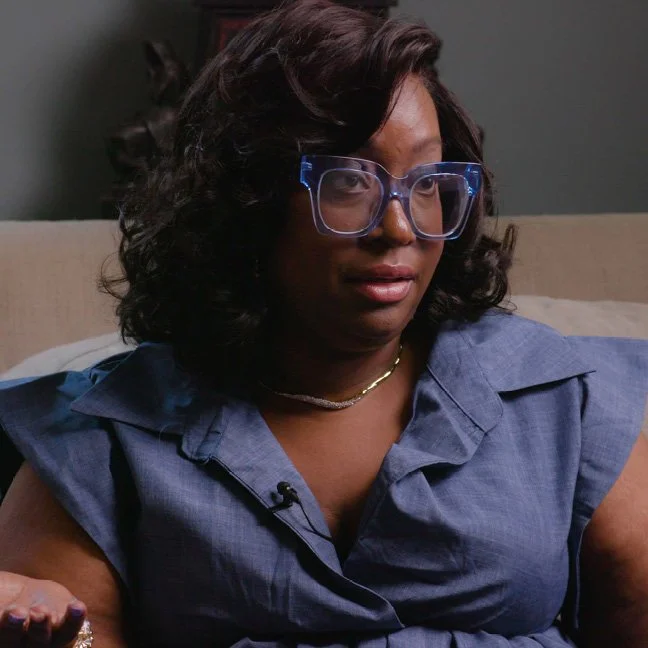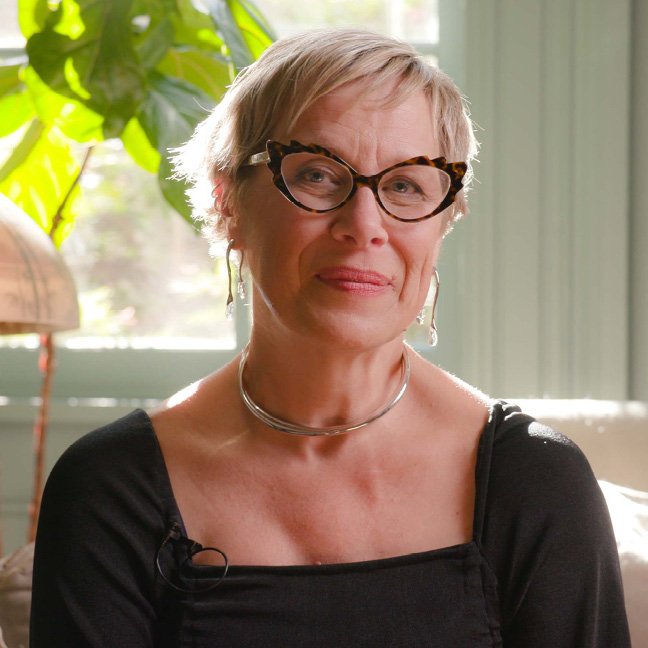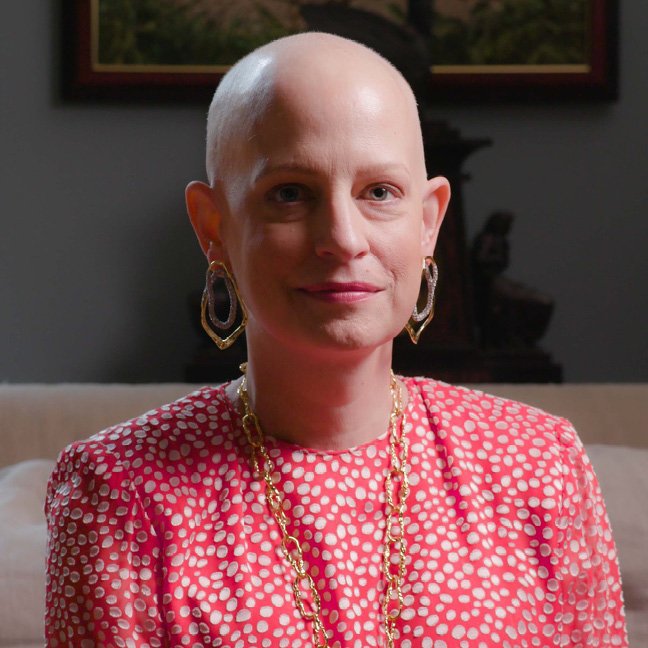Alexis Bittar x Jimmy Paul x Living Beyond Breast Cancer INTERVIEWS
ALEXIS BITTAR & JIMMY PAUL for LBBC
Battling breast cancer is debilitating, exhausting, and scary...but the support that organizations like Living Beyond Breast Cancer provide, and the courage of its members, is inspirational and, quite simply, majestic.
Alexis Bittar invited five breast cancer survivors – or, as one of the woman, Keneene Lewis, calls them, “breast cancer thrivers” – into his home to get glammed up, spend the day together and to talk about their challenges, journeys, and unwavering resolve.
Legendary hairstylist Jimmy Paul – a fashion show mainstay who’s worked with a Who’s Who supermodels and celebrities, and has been friends with Alexis for many years – handled each woman’s hair, which, understandably, included a choice of wigs. Each woman brought with them an extra-chic outfit, to accessorize with Alexis’ jewelry.
Here, in their own voices, is each magnificent woman’s story.
https://www.youtube.com/watch?v=ZEYfT7imUV8 — Campaign Video
Keneene Lewis
When Keneene Lewis, 44, was undergoing chemotherapy in 2019 for stage three invasive ductal carcinoma oestrogen progesterone positive HER2 breast cancer, she responded in a way that reflects her undeniable determination and grit.
“I told myself, “I have to flip cancer on his ass,” she asserts. “It’s not going to take what makes me me.’”
Today, she’s, as she puts it, “a breast cancer thriver”, and celebrating five years free of the disease, after treatment that included nearly three dozen rounds of radiation.
Her support system includes her daughter, who’s a college student, and organizations like Living Beyond Breast Cancer, where she works as a support services coordinator. The community of cancer support groups, she says, “encourage and inspire me. They also allow me to be me Keneene 2.0, so that I can be my best me, and alive every day fully, presently, fearlessly.”
Inevitably, cancer has immutably changed many aspects of her life.
“I lost my hair -- my hair never came back,” she explains. “I gained weight, and that's not going away quickly. I'm fatigued; I have lymphedema; I have insomnia. It affected like my teeth to where now I have to have braces. Side effects came no matter what, and it's fine, because I'm still here.”
She’s philosophical about her journey of battling cancer and the way her life and mission have evolved.
“There's some reason you're going down this path,” she asserts, “and I believe that the reason why I'm going on this path is what I do right now. I sincerely believe that.”
Her goals for life are both straightforward and inspirational.
“I have to live it fully, and I have to give and pay it forward,” she says. “I have to help the next woman or man so that they're not feeling alone, don't have the resources, don't have the support, don't have whatever they need.”
Megan Rutt
As the chair of LBBC’s board of directors, Megan Rutt works with people who are battling breast cancer every day. For her, benevolence and empathy go hand in hand: Megan was first diagnosed with breast cancer in 2013; it recurred, and she’s currently in the midst of 35 sessions of radiation.
“You really start to claim your life in a way that you hadn't before you'd gone through those traumas,” she says. “It really, really, really recalibrated for me what success was.”
Today, that success includes her family – she and her husband are raising three children – and her work with LBBC. Her cancer diagnoses have helped shed a light on what’s most important in her life.
“I felt a clarity of priorities and that which I was truly grateful for,” she adds. “I think now I can look at other people with much more compassion.”
These days, the way she projects herself to the world is simple. She describes it as comprising of three essential elements. “It's confidence -- this quiet confidence where you're accepting help, knowing your vulnerabilities, and acknowledging those vulnerabilities and other people. It's gratitude. It's kindness – and not the kindness that people wear on their shirt, but it's actually practicing that and really living that way.”
The empowered and diverse network of people she’s met though LBBC has played a vital role in her own fight with cancer.
“If this diagnosis had happened within a vacuum, it would be hard to have perspective on what good could come of it. Being able to share my experience, and being able to hear other people's experiences, has really given this whole thing meaning. Living Beyond Breast Cancer is just an incredible community of support. I've learned from other women their strength.”
Michelle Anderson-Benjamin
Michelle Anderson-Benjamin, 39, was first diagnosed with breast cancer three years ago; it recurred last year, and now she is undergoing treatment for stage four breast cancer with characteristic resolve and determination.
“I'm a firm believer that some of your purpose is your passion,” she says. “I go to treatment every three weeks, but I don't allow my illness to be negative in my life.”
Michelle constantly helps others: she’s a certified mental health coach and advocate, and also a death doula, as well as a LBBC leadership volunteer.
“Every day, I encounter and speak with other cancer patients, both men and women, and try to help them advocate and get the tools and resources for themselves,” she explains. “I'm a pillar in my community. but I'm also a mom that's creating a platform for my children.”
As the mother of a son and daughter, one of her main goals is, as she puts it, “creating a legacy -- that's always been my agenda as a parent. Having cancer wasn't going to stop that. It put a battery on my back that time is not promised, so everything that I've ever wanted to achieve in my life, I'm doing it.”
She advises cancer patients daily: “both men and women, and try to help them advocate and get the tools and resources for themselves,” she says.
That includes education about breast cancer, which she’s empowered her kids with too.
“The unknown is the worst, the worst part of life when you don't know. And you can't advocate and you don't know how to ask questions. That's how people take advantage of you.”
Instead of hiding her cancer battle from her children, she sees it as a way to inspire and educate.
“I want them to understand that this is what Mommy has to go through,” she says, “but I also want them to see how I pushed myself, how I made sure that regardless of what I was going through, I still showed up, when I could and sometimes I couldn't. In reality, these are also life lessons. Cancer doesn't have to knock you on your ass.”
Jenny Burkholder
At first glance, Jenny Burkholder – a spunky mother of two who is a writer, teacher, and the Poet Laureate in Montgomery County, PA – looks like she’s been untouched by cancer.
Looks, however, can be deceptive.
Jenny was diagnosed with breast cancer twice: first, in 2012, with early stage breast cancer, and seven years later with breast cancer that had spread to areas like her spine and hips. After treatments like chemotherapy, she’s now on the drug Herceptin, so is without the outward signs, like hair loss, that many people associate with the disease.
Encouragement from her husband and teenage daughters has helped her through, as well as the communities she met through organizations like LBBC, where she’s a Helpline volunteer and a Hear My Voice: Metastatic Breast Cancer advocate.
Her children, who were 3 and 6 when she was first diagnosed, have grown up with a vivid understanding of what she’s gone through. “I shaved my head,” she recalls. “They saw my scars,” she recalls. “I tried to include them in the ways that I could, but they were young. My diagnosis is like the backdrop of their lives. There are definitely some ways in which they have absorbed and are more openly aware of disease, and people suffering. They're very empathic.”
For others who are battling cancer, Jenny acknowledges the power of little, uplifting things throughout the day.
“Treatment is punishing,” she admits, but one key to coping is to “find the ways that are going to support you: people who are going to support you, therapies that are going to support you, all of
those things. Take the opportunity to live in some sort of happiness or joy, wherever you can find it -- if it's spiritual, or if it's writing, if it's dancing, music, whatever. Having a cancer diagnosis can be incredibly joyless.”
Emily Hunt
A decade ago, Emily Hunt was, as she puts it, “living the dream”. She and her husband Brad had settled into a newly-purchased home with their baby daughter Presley, and Emily was working at a pharmaceutical company.
But, like so many women have experienced, breast cancer had other plans.
In 2013, she was diagnosed with early stage breast cancer. In spite of aggressive treatment, including a mastectomy and chemotherapy, her cancer came back two years later. In 2018, cancer returned again, this time as metastatic cancer of the lymph nodes. She’s on her eighth line of treatment. and has had brain surgery to deal with side effects of her cancer treatment.
“I’ve been through the wringer,” she admits. “It’s been a long ten years.”
She compares the experience to being on a roller coaster, knowing that at some point, you’ll get to the top and come crashing down.
“It's that constant fear, because you don't know when you're going to have the next recurrence or the next progression,” she says. “It’s waiting and waiting and waiting, and you know it's coming eventually. I have a lot of anxiety about it.”
Nonetheless, she’s found she’s a resolve she didn’t know she had.
“It's a cheesy saying, but you don't know how strong you are until being strong is your only choice,” she says. “Until you're tested, you don't know what you're capable of.”
That resolve sets an example for her daughter too, she says, “just to have a role model of how to
be strong.” Like many people who are fighting cancer, Emily is realistic about her future, including the possibility that her life will be cut short by the disease, and the impact that will have on her daughter.
When reflecting on her daughter’s future; “She's probably going to lose her mom at a young age,” Emily says, “but when she's an adult, and she can look back and say, ‘My mom did this; my mom fought; my mom did everything for her.’ She can know that she is strong too.”
Tearsheets by Paige Schubert, Graphic Design Intern, PhotoBook Magazine








